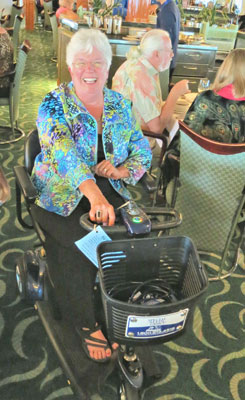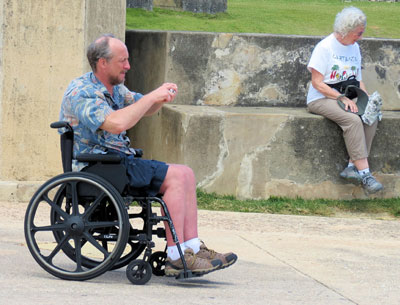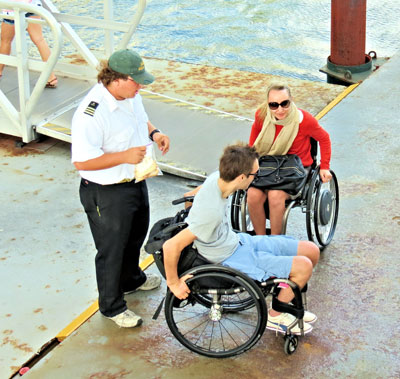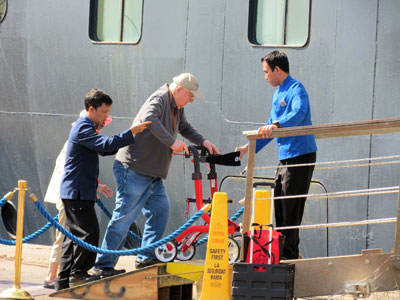Tips for the disabled traveler at sea
This article appears on page 35 of the July 2014 issue.
by John Towler; Waterloo, Ontario, Canada
My wife, Lorna, and I are especially attuned to the needs of disabled travelers, as we both have family members with special needs. My father was a diabetic for most of his life, and, as a professor of Psychology, I have frequently worked with the disabled.
I, myself, was briefly confined to a wheelchair. However, that didn’t stop me from traveling through three other countries by air and coach.
My wife and I have visited more than 80 countries and lived for extended periods in seven of them. We are amazed at the courage and stamina of disabled travelers and at the changes the travel industry has made to make travel easier for them.
I thought it would be helpful to describe what obstacles might be encountered while traveling these days and offer some advice. In preparation for this article, I spoke with disabled travelers, cruise ship directors and suppliers of equipment for the disabled.
Cruise lines’ positive changes for disabled travelers
The US Census Bureau reports that, as of 2010, there were 56.7 million people in the US living with disabilities. Things have changed since the passage, in 1990, of the Americans with Disabilities Act, which prohibits discrimination based on disability, and several landmark lawsuits have resulted in the removal of some of the barriers to travel.
Cruise lines have made the most accommodations, and they now offer a wide range of arrangements to meet the needs of the disabled.
Ships operating from or to the US (and many that operate in the Mediterranean and elsewhere) offer wheelchair-accessible staterooms, wider doorways, handrails, roll-in showers, roll-in closets and no threshold barriers to decks and verandas.
Wheelchairs and motorized scooters are allowed on board. In many cases, cabin stewards will pick them up from your stateroom, recharge the batteries and return them when you need them.
Most cruise ships have lifts to help people in and out of the swimming pools.
To assist the blind, Braille is standard on most ships and includes stateroom numbers, indicators in elevators and, on occasion, menus. Often, guide dogs are allowed, and some ships provide vibrating alarm clocks.
For the hearing impaired, there are indicator lights for doorbells and phones.
Shore excursions
One of the biggest difficulties for mobility-impaired people on a cruise is getting off the ship at ports where tenders (boats that take guests to shore) are used. Holland America Line’s newest ships offer wheelchair-accessible tenders, and they are retrofitting older ships to provide this service.
This line seems to be particularly attentive to travelers with disabilities and has a special department, with dedicated managers and trained staff, to assist these guests.
Other lines are following suit, some offering services for travelers with autism, Asperger’s syndrome, Down syndrome, Tourette syndrome, cerebral palsy or other developmental cognitive disabilities.
A major problem over which the cruise lines have little or no control is the difficulty disabled travelers can have moving about on shore. Motorized scooters are very uncomfortable on cobblestone streets, and maneuvering a walker or pushing someone in a wheelchair on these streets can be exhausting.
At some ports, shuttle buses or coaches that can handle wheelchairs and walkers are provided.
The lack of restrooms accessible to the handicapped can be an issue while traveling, and restrooms at some locations lack curb cuts for access. (Tahiti is particularly lacking in this regard.)
Planning ahead
With careful Internet research and planning, almost anyone can see the world. Here are some tips and observations that may help travelers with disabilities.
• Notify the cruise line or airline about your particular needs as far in advance of the trip as possible, as accessible accommodations on a ship or appropriate seats on an airplane may be limited in number. Be specific about your disability and what you will require.
• It is easier to rent a wheelchair or scooter for your trip than to take your own. Contact the cruise line to make the arrangements.
• Check on which ports on your itinerary will require tenders. Every cruise line has a list of these ports.
• If you require oxygen equipment, you must take your own and handle it, yourself. A ship’s staff is normally prohibited from handling this type of equipment for you.
• Remember that prescriptions cannot normally be filled outside of your home country, so pack enough medications to last the length of your trip (and then some, in case of delays).
• If you are not able to take care of all of your own needs while traveling, you will have to be accompanied by a companion.
• If traveling with a service animal, you must have all of the required papers, and you must provide a medical certificate outlining your needs.
• Passengers with special dietary requirements should make arrangements for special meals as early as possible. No-sugar and low-sodium meals are usually not an issue on board but may be more difficult to find onshore.
• Be sure to obtain adequate travel insurance.
• For passengers being treated for a particular medical condition, keep the name and contact information of your doctor on hand together with a letter outlining your condition and treatment plan.
• Wear some form of medical-information identification. Carry a list of all the medications you are taking.
Travel for diabetics
If you have diabetes, extra planning will be required.
• Outside of your home country, insulin may vary in its concentration, so don’t depend on purchasing additional supplies abroad. The same applies to syringes; those purchased abroad may not fit your containers.
• Keep your medication, syringes and blood-testing equipment in your carry-on luggage.
• Ensure that your insulin is insulated; unless it is protected and kept cool, it may lose its potency.
• Prepare to deal with airport officials. Your supplies must have a prescription label with them. If you are wearing an insulin pump, notify security and do not allow them to remove the meter.
• Test your blood sugar more often than usual, and be aware of time zone changes, remembering that you may encounter the loss or gain of several hours.
Information sources
The Internet provides a great deal of information for travelers with disabilities or special needs, varying from excellent ideas to simple lists of complaints. The following are some of the websites that you might find useful.
www.disabledtravelersguide.com — Advice for people with disabilities planning international trips, including a country-by-country guide plus personal travel accounts.
www.disabledtravelers.com — Listings of tour operators, cruise lines and travel agents that work with disabled travelers; listings of accessible tours and cruises; links to webpages stating airlines’ policies for passengers with disabilities, plus information on special products, services, etc.
www.barrier-freecruising.com — Offers tips on choosing accessible cruise lines, destinations and shore excursions, listing travel agencies and services abroad.
www.cruisecritic.com/cruisestyles/area.cfm?area=30 — Information, advice and news for disabled travelers considering cruises, plus a forum as well as reviews from passengers with disabilities.
www.specialneedsatsea.com — For cruise passengers, rentals of special-needs equipment pertaining to all kinds of disabilities, with delivery to the ship. Delivery is also available to a number of overseas hotels.
http://cruisediva.com/accessible.htm — Information on choosing a cruise ship with adequate accessibility and what to expect on board.
www.travelguides.org — A listing of worldwide hotels, resorts and attractions that cater to disabled travelers; links to tour operators and tour guides familiar with special needs, and, covering a number of overseas destinations, online travel guides with information for the disabled.
www.accessiblejourneys.com — A tour operator for wheelchair travelers and their travel companions.
Hopefully, the above information will prove helpful.




